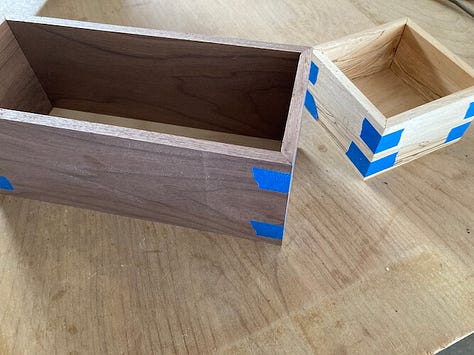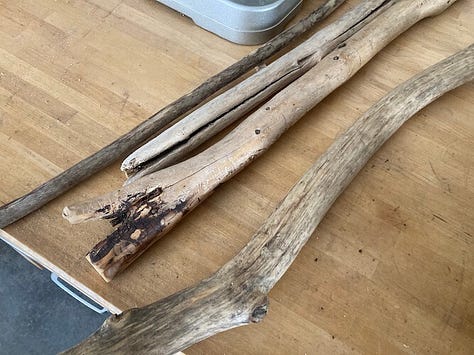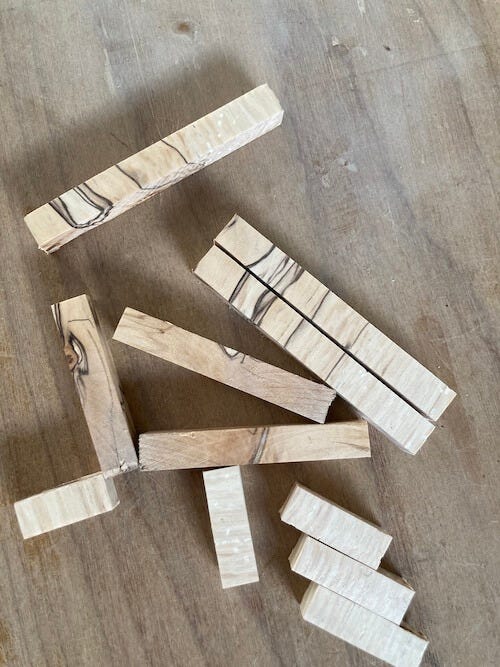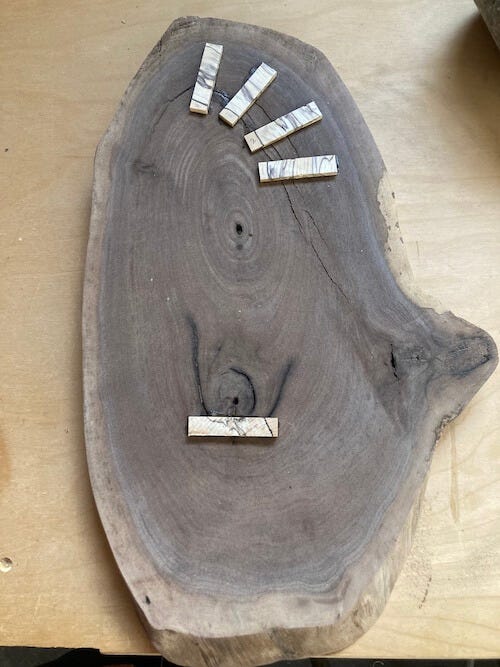Hello, and a quick update: my shop has been renovated with new outlets, dust collection, air filtration, and less clutter (all that last means is I finally got rid of the rocking chair, which served no purpose other than to be a place of quiet futility when I couldn’t figure something out). I meant to write about it this week, but my thoughts were all jumbled and no amount of editing would wring any coherence from my notes.
One story I enjoyed listening to was this piece about the rise and folly of books that tells us how to be happy and live good lives.
Here are some things from my shop: I’m focusing on building little boxes (finally!) as a way to practice my mitering and joining and measuring skills. I don’t know how to do inlays, but I do know how to plug holes, so I experimented with using a series of forstner bits to cut holes and then plugging them for a cutting board. And I picked up some driftwood a couple of months ago in the hopes of making a jewelry holder like the one we used to have in Massachusetts.



Essay is below—I hope your next couple of weeks are filled with fun projects in process!
Motivation and its antagonists
Who do you want to be?
Last year, I listened to a podcast about how people struggle to figure out what they want to do in life. The host and guest talked about how people might pursue a passion because of intrinsic motivation, but as soon as external rewards are attached, their motivation would dissipate.
At the time, my ears perked up. What, I wondered, did this mean for pursuing a livelihood in the craft you love? How do you fuel your intrinsic motivation when you are making money from that passion? Is it foolish to attach economic incentives? (An argument could be made that it’s easier for me because I’ve earned so little money up to now.)
Perhaps these are two entangled questions that should be separated—the who from the what. Who you are from what you do.
But can we? We are our actions, choices, and beliefs. We are those ephemeral notions because they influence how we treat ourselves and others, who we spend time with, who we reject and marginalize, who we try to carve out of our lives and who we carve out time for. Those closely held beliefs have major impact on other people’s abilities to live their own lives, and so our identities (the who) are accountable to our actions (the what).
This seems more true than ever with what is going on in the world. Here I am thinking about this in the context of my own little work and shop and business, a mere mote of dust on the world’s stage. But in reading the news, it is clear that those core beliefs we prize about ourselves transform other people’s lives. Those beliefs take us, we inhale them so deep it seems we’d rather choke than relinquish them.
Some days, despite getting to do work I love, I utterly lack motivation for it. Sometimes that’s because it’s not enough to just make stuff; I’ve got to build a relationship with the world outside my shop and that means marketing and selling.
Motivation comes easy when the work feels distant from economic incentives.
Obviously there are many much bigger, much more profitable businesses run by people who seem highly motivated by economic interests. All the external rewards keep piling up and they are chugging along just fine, at least from outside appearances. As if they have learned a secret lesson opaque to me whereby a voracious appetite equals value.
Sometimes I lack motivation because the world has intruded on my shop. Current events make the work that I was so motivated to do seem worthy of interrogation. Does this matter? Am I in any way addressing the very many serious concerns and pains that plague so many?
I am no international relations expert, no scholar, no person with power. I’ve got nothing but sadness—a poor, ordinary feeling, an unsophisticated response to a confusing barrage of anguished news. Not one bit useful.
Sarah Bakewell wrote about a method the humanist Jeremy Bentham came up with—a “felicific calculus”—to assess the worthiness (beneficence? usefulness?) of one’s actions: “If I do something, will it (so far as I can tell) make everyone involved happier, or will it make them more miserable?”
Most of us do work each day that impacts a small circle of people. There are lots of us ordinary workers, the people who make stuff or keep things running, people who tend the land and tend to our young, to our old, to those who need assistance tending to themselves. These are ordinary lives not filtered for public consumption.
In this light, ordinary is magnificent.
I am heartened by the many people who are attempting to take actions that don’t hurt others, by those who actively help and give aid and assistance. The few who are failing Bentham’s felicific calculus are causing incredible harm. But they are not the majority. It’s important to keep that in mind.









"I finally got rid of the rocking chair, which served no purpose other than to be a place of quiet futility when I couldn’t figure something out"
A lot of modern day woodworking learning consists of one woodworker showing another how to do something. If your WiFi can reach your shop, it might have been a mistake to get rid of that rocking chair. When I reach that point where I can't figure out how to make part of something, I'll surf the web, starting with YouTube woodworkers that have years of videos. It may take several variations in search terms and searching more than just YouTube but I nearly always find something that either shows what I need to do, and learn how to do, or something like it that I can adapt. It seems to me that rocking chair is a good place to start looking from.
Another source of help are woodworking forums. Answers tend to be slower in coming though.
I have to go all the way back to my house to search the web because my shop isn't wired for WiFi plus it's a metal sheathed pole building which is a pretty effective Faraday cage. Otherwise I might ask if you've gotten rid of that rocking chair or would like someone to take it away.